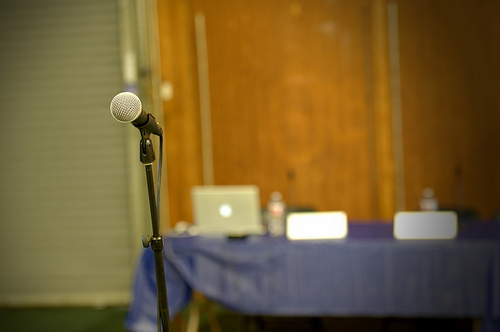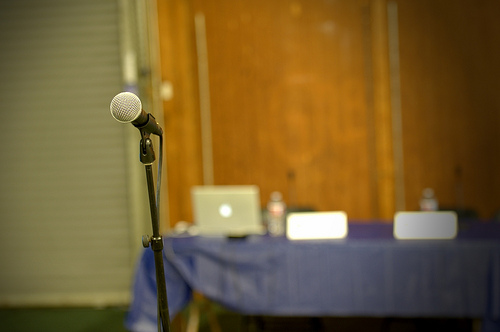For pretty much any conference or event you’re organising, one of the most important things to get right is your speakers. If you get a line-up of who can deliver excellent content for your audience, then you’re likely to have a very successful event.

Many conferences or exhibitions have a “Call for Papers” or similar; where they invite members of their wider community to put themselves forward for selection. In some spaces like academia, this convention is hard to break, but I think conference producers can improve their event with a more pro-active approach to speaker selection.
With a speaker pitch process or call for speakers, you can often find the yourself with a clique of speakers, who understand your selection process and know how to put an effective pitch together but might not be able to deliver a world class talk.
In this article I want to illustrate a number of approaches that have helped me track down excellent speakers for my events – without rely on a speakers putting themselves forward.
Find Speakers Already Active in the Space
One sure-fire way to track down good speakers is to look for experience; but as a conference organiser you may struggle to get along to as many events you don’t organise. There’s no substitute for seeing a potential speaker in the flesh, but there’s a lot you can do to find great prospects from the comfort of your desk.
I always start by searching Slideshare for keywords associated with my events. I can quickly find presentations delivered in the past and use the view count to get a sense of some of the most popular. Not only can you see which talks are strike a chord with your community but you can get a real sense of the quality of their slide design. Gone are the days where templated decks of bullet points being enough. I want to find speakers who take the time to present their ideas in a visually creative way.
If you are able to find a number potential speakers from Slideshare, I then take the time to search for them on YouTube and on Google (using the video filter). Not every potential speaker will have video of them in action online, but I’ll often remove people from my shortlist if I find a video where they don’t live up to my expectations. Charisma and delivery are really important and if they lack those traits then you shouldn’t invite them in-front of your audience.
Finding Great Debut Speakers
Having experienced speakers is a safe bet for any conference or exhibition but if you really want to stand out from your competition having speakers who none of your attendees will have heard before can work well.
If there’s people in your industry who blog, that can be a great place to start. Take the topics you want to get covered, pop them into your favourite search engine and append the word the ‘blog’, this will return blog articles written about the topic, It’ll normally be easy to track down the author and approach them directly.
However if there aren’t people regularly blogging in your space it can be much harder to find these passionate amateurs, in these circumstance I typically turn to social media. I look for relevant LinkedIn Groups or Quora Threads. Who’s answering questions your audience would have in a really comprehensive and passionate ways?
I also make use of Tools like FollowerWonk; which is a search engine of Twitter biographies. I can search for people who have the job description of my ideal speaker or maybe include topics I’d like to have covered. If you want an expert speaker on Oil and Gas in Kazakhstan you can search for that and find them.
Who’s already influential in your field?
Experience and expertise can be great things to use to find a great speaker, but influence can be another quality to base speaker selection on. Have a look through your attendee lists, who has attended your event every year without fail? They may be too shy to put themselve forward but clearly love your event and would be flattered to be approached.
Alternatively tools like Klout and PeerIndex can help you track down people influential on a particular topic but I like to find people who have attended my events and been very active and influential on social media, these people have sway and often make great speakers.
I use a free tool BlueNod to visualise all the people tweeting on a certain hashtag, the bigger the circle (and their face) in the network the more influential they’ve been on that particular hashtag. You’ll typically find speakers and organisers with the biggest circles, but I’m looking for people who have large influence over my event’s attendees but we haven’t had speak before. They’ve clearly got passion for the topic and often will have the potential to attract more attendees to your event.
In Conclusion
In conclusion there’s a number of ways to find speakers for your event, putting out a call for speakers can be a very effective way to find speakers but can often lead to a clique of speakers who understand how to pitch talks and leave you with a stale agenda. Far more effective approach can be to be more active in finding your speakers and create an agenda of speakers who may not have put themselves forward to speak but can deliver excellent content that your attendees love.
Photo by Guillaume Paumier





